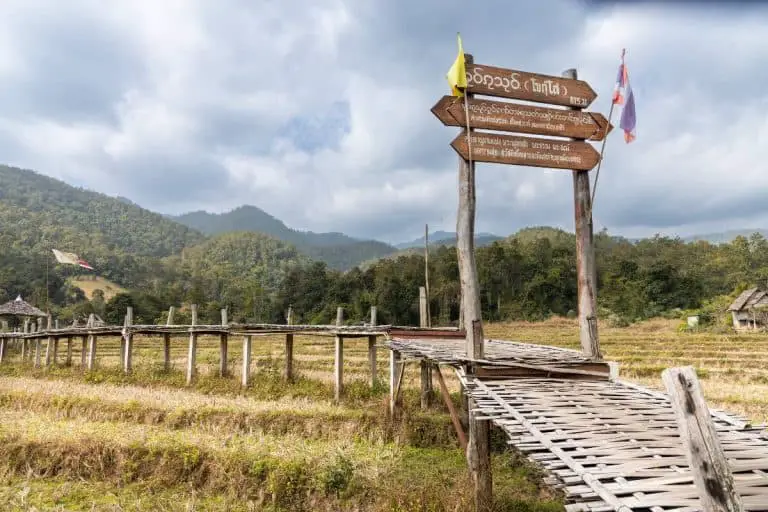Living in Thailand on a Budget: Top Tips and Tricks
If you’re considering a move to Thailand, then you may be taken aback by how expensive the country can be. But guess what? Living in Thailand on a budget is indeed possible! As an ex-pat living here for over five years, I have learned so many tips and tricks that have enabled me to stretch further. In this blog post, I’m going to share with you exactly what it takes to live happily and affordably as an ex-pat in Thailand. So don’t stress about breaking the bank; come along with me as we explore all of the ways that you can save money during your stay here!
Thailand is a great country to live in. Whether you choose to work or travel, you can enjoy an affordable lifestyle and still have a high quality of life, According to international citizens, Particularly compared to the U.S., regular monthly expenses in Thailand, including rent, are around 55% lower.
Key Takeaways
- Regular monthly expenses in Thailand, including rent, are around 55% lower compared to the U.S.
- Focus on finding quality and affordable housing. Look for deals and discounts. Take advantage of public transportation options whenever possible.
- Opt for local restaurants over more expensive western food. Save money by shopping at markets rather than supermarkets.

Cost of Living in Thailand
Overview of average costs
Thailand can be a great place to start a new life, especially if you are on a budget. Expats typically spend anywhere between 20,000 – 55,000 THB (or roughly $600 – $1600 USD) each month on all living expenses, food expenses, and activities. These include rent, groceries, utilities, transportation, and entertainment costs like movies or meals out with friends.
While this might seem higher than staying in some other countries, the cost of living in Thailand is still quite affordable compared to many other places around the world. Plus, there is so much to do and see in this stunning country that you’ll always have plenty of reasons for your money to go further.
Comparison to other countries
Living in Thailand, particularly when compared to countries like the U.S., is substantially cheaper. For example, Thailand cost around 55% lower, while the cost of commodities such as food and basic services are calculated to be lower than that in the U.S.
Such a dramatic difference in regular expenses also extends to healthcare and education, both of which are amply accessible at considerably low costs when living in Thailand (compared to the U.S) Although other countries will undoubtedly offer different benefits depending on where one chooses to live, there is no doubt that the overall cost of living in Thailand makes it an especially attractive destination for many people seeking an exciting and comfortable lifestyle for an incredibly reasonable price.
Key expenses to consider
Living in Thailand as an ex-pat can offer a unique and exciting life experience. However, some key expenses should be taken into consideration beforehand to ensure a smooth transition. Healthcare is one of the most important expenses to budget for when relocating. The public system doesn’t provide coverage for digital nomads, hence it is recommended that adequate health insurance is obtained before arriving in Thailand.
Additionally, any foreign citizen spending 180 days or more in the country will have to pay taxes on their salaries of around 5% to 10%. This means that pre-calculating expected expenses may prove essential.
Finding Affordable Accommodation
Options for budget-friendly housing
For those of you who are looking for a place to live in Thailand, there are many options available. This includes the following:
Apartments – Apartment buildings can be found in some towns and cities in Thailand. There are also budget-friendly apartments that you may rent and the average range of a budget-friendly apartment is THB 5,016($150) to THB 20,064($600) a month if you choose an Airbnb type of apartment. However, if you choose an apartment with two or more rooms, this can cost you THB 30,000 ($900) a month and more.
Townhouses – There are many budget-friendly townhouses in Thailand that offer excellent value for money and can be rented out by ex-pats without any problems at all. These properties can be found in places where the cost of living is budget-friendly such as in Chiang Mai, Chiang Rai, and Pak Nam Pran.
Condominiums- These are perfect for ex-pats who want to live near commercial establishments like shopping malls, restaurants, etc. Condominiums can also be found in other parts of Thailand such as Chiang Mai, On Nut, Phra Khanong, etc.
Best neighborhoods for budget-conscious travelers
Tips for negotiating rent
If you’re a foreigner in Thailand, you can easily be taken advantage of. This is especially true when it comes to negotiating rent. Thus, when it comes to negotiating rent, there are a few things that you can do that will help you get the most out of your rent. These include to following:
Know your budget. You should have an idea of what you’re willing to spend on rent before you start looking at apartments. Start by consulting a local real estate agent or doing some research online.
Don’t be afraid to negotiate. The Thais are known as very good negotiators, so don’t be afraid to push back on the price you’re being offered if it doesn’t feel right
A smile goes a long way. Be friendly and pleasant when speaking with a potential landlord, and they’ll likely be more willing to work with you on the price or other details of the contract.
Long-term rental – The most important thing to remember is that long-term rental can be used as a negotiation tool. The landlord will want to negotiate your deposit and first month’s rent, as well as the length of the lease. If you can get a long-term rental, then they may be willing to cut some corners on the other items.
Paying rent upfront – The reason why paying rent upfront is a good idea is that it gives the landlord the opportunity to increase their monthly income by charging an extra amount for the first month. This way, you’ll be able to save some money and get a better deal from your landlord because they will be focused more on the big amount of money they will receive from you.
Request furniture/Appliances/Items – If you have a place to live, you will have furniture, appliances, and items in your apartment. This is not ideal for you as an ex-pat who is looking for a budget-friendly lifestyle in Thailand. Thus, requesting furniture, appliances or any household items from the landlord will save you a lot of money because you are not going to buy them yourself.
Don’t get discouraged if you can’t find anything within your budget. Keep looking! It may take some time to find the right place.
Food and Groceries on a Budget
Exploring local markets and street food
Thailand is a wonderful place to explore, but it can be expensive. Luckily, there are all sorts of ways to eat well and still save money in the country. You can buy all sorts of goods in their local markets. It is one of the best ways to find cheap eats in Thailand. Just like any other market, you’ll have your pick from fresh fruit, vegetables, meats, and seafood. You’ll also find some really interesting products that you might not have seen before (such as cow’s milk) at these markets.
Street food is another great way to save money while living as an ex-pat in Thailand. Eating street food is a great way to try new dishes without breaking the bank. You can try their famous street foods like Pad Thai, Khao Soi, Guay Tiew, Pad Kra Pao, and many more and these are all affordable!
Preparing meals at home
If you are on a budget and looking for ways to save money, cooking your own meals at home is one of the best ways to do it. The first thing that you need to do is learn how to cook your own food. This doesn’t mean that you need to become a chef or anything like that, but it does mean that you should know how to prepare simple dishes like pasta and stir-fry vegetables with minimal effort on your part.
The second one is to buy ingredients at local markets instead of buying them pre-packaged at grocery stores or supermarkets. This will allow you to save money by not having to pay for packaging materials and transportation costs (which can add up quickly). You also won’t have any preservatives or additives added to the food that may be unhealthy for your body. More importantly, you can store all of the goods you will buy from the market in the refrigerator and can also reheat the dishes you will make that can be consumed for a day or two.
Finding deals and discounts on food and drinks
If you’re an ex-pat in Thailand, you might not have much money to spend on food and drinks. That’s why finding deals and discounts on food and drinks is a very important skill that you must have in order to save money.
You can do this by checking out any coupons that the establishments in your area are offering. If there are discounts or coupon codes available, it’s likely that they’ll be accepting them. You can also ask around at local shops or restaurants if they offer discounts. You can also search for these deals or discounts on their stores’ online pages or websites.
Transportation on a Tight Budget
Using public transportation
Public transportation in Thailand is a great way to get around and save money. There are many different routes that you can take, and they will all be more convenient than your own car. The best part about public transportation in Thailand is that it’s affordable, which means that even if you’re on a budget, you can still enjoy the luxury of riding on a bus or train. Public transportation includes Tuk Tuks, Songthaews, Buses, and more!
Renting a scooter or bicycle
Thailand is one of the most popular destinations in Asia. It’s a beautiful country and there are so many things to do here. But if you’re on a monthly budget, renting a scooter or bicycle can be an affordable way to get around.
Renting a scooter or bicycle is easy in Thailand and there are many companies that offer these services. On average renting a scooter or bicycle costs THB 200(6$) per day, however, it can also cost THB 150 per day ($4.50) for smaller scooters or bicycles. However, keep in mind that in renting a scooter or bicycle, you must have a driver’s license.
Hitchhiking and other alternative transportation options
Contrary to what some people may tell you, hitchhiking in Thailand is a straightforward process that is also quite safe. You only need to follow the standard procedure, which consists of standing with your thumb out in an area with slow traffic and giving enough space for passing automobiles to safely pull over. Get used to riding around in the back of pick-up trucks for a good portion of the trip. Even though it’s the middle of summer, you should still bring a raincoat, some warm clothes (particularly if you’re going to be hitchhiking at night), and a waterproof cover for your backpack. Hitchhiking in Thailand can lead to some very unforgettable adventures and discoveries.
Additionally, some individuals may extend an invitation for you to stay with them in their houses. Even though it is not often encouraged, sleeping outside is not dangerous, particularly in areas where people do not frequently walk. You can also spend the night and get a taste of authentic Thai culture by stopping at a temple (which is plentiful everywhere except maybe in the Muslim provinces in the far south) for the night, where you will typically at the very least be received with a bit of floor space to sleep on and a place to wash. This is another way to spend the night and get a taste of authentic Thai culture.
Hitchhiking is common in Thailand due to the abundance of motorbikes and the welcoming nature of their drivers. Keep in mind that doing so while carrying a backpack can make it more difficult, and always remember to ask, signal, or mimic to see if they have an extra helmet. If you hitchhike, you won’t have to endure the bitter cold of the buses, and you might even meet some interesting people from other countries. They do not expect you to pay for the rides, but if a person who is not particularly wealthy offers you a long ride, it is considered proper etiquette to buy him lunch if you have the means to do so.
There are a lot of individuals in Thailand who are unaware of the existence of hitchhiking, but there are also a lot of people who are familiar with the idea and name it “bow,” which literally translates to “wave.” These people will always let you off at a gas station or another appropriate location for you to continue your hitchhiking journey.
Budget-Friendly Activities and Attractions
Exploring local temples and parks
The most popular and widely visited tourist destinations in Thailand are its beaches, islands, waterfalls, caves, and national parks. But there is also an abundance of temples and parks that are free to visit. It’s a great way to experience the beauty of Thai culture without spending a lot of money. Such beautiful places include Lumpini Park, Wachirabenchathat Park, Sanam Luang, Tiger Cave temple, and many more!
Participating in free or low-cost events and festivals
There are many festivals that take place throughout the year in Thailand, such as Songkran, Yi Peng, and Tiger Muay Thai Festival. These events offer an excellent opportunity to practice your Thai language skills, meet fellow foreigners, and enjoy a day or two of food, music, and dance with like-minded people.
Taking advantage of student discounts and senior rates
If you are over the age of 60, a student enrolled in college, or a teacher then the Land of Smiles is your oyster. Thailand has some of the most captivating and culturally rich destinations in the world–from Sukhothai to Chiang Mai–and now there’s even more reason to check them out due to their generous discounts! According to ttrweekly, The 20% discounts offered to seniors, disabled passengers, students, and educators make it easier than ever to explore some of the majestic wonders Thailand has to offer.
Working and Earning Money in Thailand
Options for working and earning money
Working in Thailand as an ex-pat is a great opportunity to experience the country from a unique perspective, while also earning money. Due to its tourist-friendly visa policies, it is easy for foreigners to move here quickly and take advantage of countless job opportunities; most notably teaching English.
However, there are plenty of other options available such as web development, software programming, marketing, and more. Depending on your skill set and desired job type, you can easily find work in Thailand with the right resources. Expats should also keep in mind that a tourist visa cannot be used to look for work and they must apply for a valid working visa if they plan on taking up employment in Thailand.
Finding a job or freelance work
If you’re interested in freelancing, start by finding out what types of jobs are available in your area–and then start networking! Research local businesses that might need help with their websites or social media accounts, and contact them directly through LinkedIn or emailing their employees directly. To help you, here is the list of jobs that you can apply for as an ex-pat in Thailand:
- Freelance writer
- SEO research/support
- Coding and website building
- Content writing
- Language teaching
- Social media support
Check an article I wrote here, where I talk about all the job opportunities in Thailand. I’m sure you’ll find something interesting to pursue. Whether it’s teaching English, working for a start-up, or joining the corporate rat race, there are plenty of options available.
Tips for maximizing your income
1. Turn your hobbies into business – If you’re an ex-pat, and you want to maximize your income in Thailand, one of the best ways to do that is to turn your hobbies into a business. There are many different kinds of businesses that people can start from their hobbies, including home-based businesses (such as selling handmade goods or art), online businesses (such as selling e-books or online courses), and even brick-and-mortar stores (like running a used book store).
2. Get a second job – One of the easiest ways to increase your income is to work two jobs. You can easily double or triple your salary by working more than one job. The key is finding good second jobs that pay well and appeal to you.
3. Live close to your workplace – Live close enough so you can walk or bike everywhere. For example, if there are no public transportation options available where you live, then living closer would also allow you to get around more easily without having to rely on taxis, which can be expensive and inconvenient when traveling for long distances often and also costly.
4. Rent out your home – Renting out your home is a great way to earn extra income while you’re in Thailand. It can be a little tricky to get started, but once you have the process down, it’s easy to earn money from home. You can find out what other people are paying for similar rooms by looking online or contacting local real estate agents.
The key to renting out something is making sure that it’s clean and looks good. If people know they’re going to get a dirty room or one with poor maintenance, they won’t stay there long or pay much money for it. It’s also important to have a good location — not too far from the center of town.
Living in Thailand on a Budget
How can I find affordable housing in Thailand?
If you’re looking for affordable housing in Thailand, there are a few options. The first is to look for apartments or houses that are being rented out by individuals or a company. This can be done through websites as well as other websites dedicated to finding tenants for homes. Another option is to look at the classified ads section of your local newspaper or magazine.
There are often listings there for rooms and one-bedroom apartments that have been rented out by individuals or companies. Another option is if you have friends who live in Thailand and might be able to get you a room. If you know someone who lives in Thailand, they might be able to help you find an apartment or house on their own property or in another location.
What are some budget-friendly activities and attractions to visit in Thailand?
Thailand is a popular destination for budget travelers, with a wide range of attractions and activities to suit every traveler’s tastes.
Here are some of the best budget-friendly attractions and activities in Thailand:
- Visit The Grand Palace. The Grand Palace in Bangkok is the most popular national monument in Thailand. If you want to take a tour, there is an entrance fee that costs THB 500($14.92 USD) for ex-pats or foreigners. Here, you can see the Arts of the Kingdom, the Queen Sirikit Museum of Textiles, Doi Kham Shop, and Khon Performance Sala Chalermkrung Royal.
- Sightseeing on a Chao Phraya tourist boat. The Chao Phraya River is the main waterway of Bangkok and the heart of Thailand’s capital city center. The Chao Phraya River starts in the north and runs south, towards Bangkok’s historic district. You can take a tour across the river by riding the tourist boat for only THB150 for unlimited use with a provided map of the river.
- Explore at Siriraj Medical Museum. If you like history, specifically, if it’s related to medicine then you should head to Siriraj Medical Museum. The Siriraj Medical Museum is a museum in Bangkok, Thailand. The museum is located at the Siriraj Hospital and covers the history of medicine from ancient times to the present day. Visiting this museum would only cost you THB 200 ($ 5.97 USD) for a day.
- The Boat Noodle Alley at Victory Monument (Anusawari) is an international hotspot for foodies and local diners alike. Nestled in a street in front of the monument, this food court has different stalls offering a range of international foods, including Hokkien noodles, fried crullers, and boat noodles. On weekends and holidays as well as at night, the alley bustles with patrons seeking delicious yet affordable international flavors. A bowl of boat noodles can be enjoyed here for as low as THB 20($ 0.60 USD), making it a favorite among budget travelers who are looking to get the most out of their dining experience in Thailand.
Is it possible to work and earn money while living in Thailand?
Yes, it is possible to work and earn money while living in Thailand. The country has a lot of opportunities for foreigners. The economy is growing and the country will continue to grow in the future. You can find a job that suits your skills and experience. You can work as a teacher, and real estate agent, build your own business, and more!
How can I stretch my money further while living in Thailand?
One way to stretch your money even further is by renting out the room in your apartment, especially if you are living alone. Then you’re earning an income from two sources: the rent on one side and from your job.
Another way is to build your own business. If you become successful in your business, you can earn much more and invest in other things that will also help you stretch your money.
What should I keep in mind when negotiating rent in Thailand?
When deciding to rent in Thailand, it’s important to remember that bargaining is an important factor. To ensure you get the best deal, you should always have an approximate price range in mind before you start negotiating, and make sure it’s not lower than your lowest limit of what would be acceptable. With this, you’ll be able to avoid people taking advantage of your lack of knowledge, instead making sure that both parties are happy with the transaction. Keep these tips when rent shopping around Thailand and you’re bound to find a great place at an affordable rate!
When you are looking to rent a property in Thailand, the following are a few things that you should keep in mind:
1. Be clear about the terms of the contract.
2. Be sure that your landlord understands the need for fair rent and the number of security deposits required by the law.
3. Make sure you know what you are paying in rent and utilities, and make sure they are reasonable compared with local market prices, taking into account any discounts or rebates you may qualify for based on your income level.
4. If possible, get all relevant information in writing as early as possible so there are no surprises later on.
Conclusion
If you’re looking to live in Thailand on a budget, following the tips and tricks in this blog post will help you save money. From negotiating your rent to exploring local markets for food, there are many ways to cut costs without sacrificing your quality of life. While each lifestyle has its pros and cons, we recommend living in Thailand if you’re looking for an affordable place to call home. To learn more about living in Thailand or other countries around the world, subscribe to our newsletter today.






